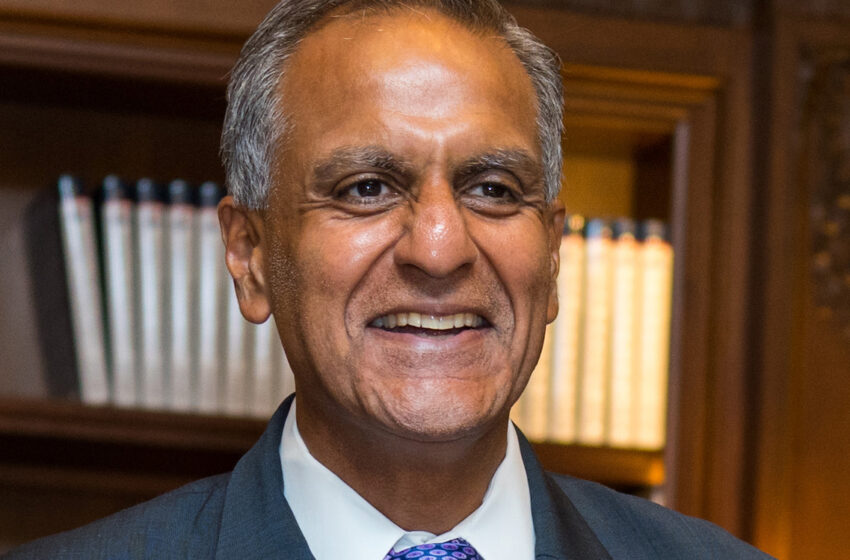People propel US-India ties to ‘an era of convergence’: Richard Verma

Richard Verma; photo by E.K. Balachandran
Overcoming the hesitations of history, US-India relations have reached ‘an era of convergence’ thanks to people-to-people ties, and it’s people again who would propel it forward, according to a top Obama administration official.
“People-to-people ties are the glue that bind our countries together, through positive and more challenging times,” Deputy Secretary of State for Management and Resources Richard Verma, said in a talk at the Hudson Institute, a Washington think tank, Monday.
“And we cannot forget this. People-centered policies and solutions must be at the core of our work together,” said the former US ambassador to India in a talk on “Milestones Reached and the Pathways Ahead” before Prime Minister Narendra Modi’s visit to the US from Sep 21 to 23.
“When I look back at where we have been and where we are today, I think it is safe to say we have entered an era of convergence in US-India ties, especially in the past three-and-a-half years,” said Verma. “Convergence on how we work together; convergence on how our countries assess shared global threats and opportunities; and convergence on how our people live and work together.”
“Do we agree on everything? Of course not; no two countries do. Yet, this is an era that now has solid foundations and a bright path ahead,” said Verma suggesting “at least four important vectors for our work together in the coming years.”
Of these, “the final vector is less about government strategic aims and more on the need to support people, as again, our people are at the heart of this relationship,” he said. “I know the political scientists in the room may say the only thing that matters is the strategic interests of each country and that people are secondary,” Verma said. “I wholeheartedly disagree with that premise.”
“The fact is that people-to-people ties have propelled this relationship forward, and we have to continue to support and lift them up,” he said. “It is why we are opening new consulates in India and why we have worked so hard to reduce the wait times and visa backlogs.”
“It is why we have doubled down on our cooperation in arts, sports, culture, women’s empowerment, and so much more,” Verma said. “It is why the student experience for Indians studying in the United States is so important to us, and we strive to make that better and easier each year.”
“And, yes, it is why the immigrant experience is such a powerful part of this relationship, built and facilitated by the shared values of our two populations,” he said.
“We’ve seen the incredible gains, from one of our astronauts in space today, to members of Congress, to so many in our military, to the doctors in our hospitals and teachers in our schools, in business, government, and across every sector of America,” Verma noted.
“Indian Americans and South Asians have made their mark, and that quest for the American dream continues,” he said describing it as “an amazing facet of our relationship.”
“That is why it is so hard to fathom perspectives that are anti-immigrant and yet pro-US-India economic, security, and cultural ties,” he said. “The two do not go together.”
READ: US-India partnership filled with promise: Antony Blinken (June 13, 2023)
“And, in fact, nothing could be more threatening or damaging to US-India ties than the recent demonization of immigrants we’ve seen careening through cyber space and our TV screens in recent days, which includes vile and racist attacks directed at Indian Americans,” Verma said.
“Let me be as clear as I possibly can – this kind of language, these kinds of attacks, have no place in American society, and we have to reject them outright,” the Indian American diplomat said.
“After all, when we speak of shared values in the US-India relationship, our countries have a long history of pushing for social justice for our most vulnerable populations,” he said.
Verma also highlighted three other other core vectors — cooperation in the field of emerging science and technology; building and developing the architecture of the Indo-Pacific and multilateral institutions to deliver greater peace and prosperity for people; and growing cooperation on defense and trade.
The US also welcomed and supported India playing a more prominent global leadership role in the institutions that matter, Verma said noting that just last week, Linda Thomas Greenfield, US ambassador to the United Nations, once again, called for India to have a permanent seat on a reformed United Nations Security Council.
“I am clear-eyed about the challenges we face, and there are many,” said Verma asserting that “so long as we are not complacent, and do not take the recent gains of the past quarter century for granted, then I do believe our years ahead can be even better, even stronger, and even more impactful.
That’s what President Joe Biden, Vice President Kamala Harris, Secretary of State Antony Blinken, and so many others have been working towards, Verma said. “And I wholeheartedly believe this era of convergence will – and must – continue.”
